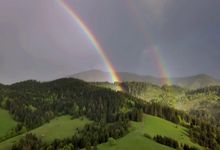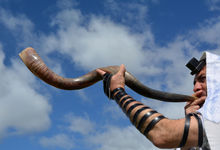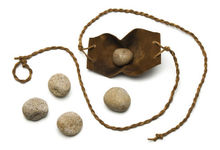Beyond despair
He was tired and completely exhausted. In fact, he could not care less any more. All he wanted to do was die. Only once he had hit rock bottom did Elijah find his way to a new beginning in an encounter with God.

“It is enough!” the prophet said. He sat down under a broom tree and wanted to die: “Now, Lord, take my life” (1 Kings 19: 4). Elijah is not the first man of God wanting to die. Moses and Jonah had felt similarly. But the reasons were quite different.
Burn-out under a broom tree
For Moses it was tantamout to an admission of failure. The burden of subduing the people of Israel had become too great for him. “Please kill me here and now—if I have found favour in Your sight—and do not let me see my wretchedness!” he said to God (Numbers 11: 15). Jonah, on the other hand, was frustrated by the fact that God had mercy on Nineveh. This had shattered his fundamental beliefs that the wicked deserved punishment by God. “It is better for me to die than to live!” (Jonah 4: 3).
In Elijah’s case it was pure exhaustion and despair, a burn-out that led to depression. He had fought and struggled for the one God, he had allowed people to live and taken life from them, he had worked miracles and made enemies. And it all came to nothing. The people had smashed the altars and killed the prophets. It had all been in vain.
Touched by a divine impulse
Elijah retreated as far as he could. He managed another day’s journey. Then he lay down and fell asleep. He had chosen a special place for his retreat. Not by the sea, which embodied chaos, the portal to the underworld. That would be tantamount to remoteness from God. No, he went into the desert. There where his people experienced guidance and care through the pillar of fire and the pillar of cloud, where they received manna and quails, and where water gushed from rocks.
Consciously or subconsciously, Elijah sought God’s nearness. And in turn he experienced divine impulses: “Suddenly an angel touched him, and said to him, ‘Arise and eat.’” The angel came twice and nudged Elijah. At first, he could only pull himself together to eat and drink something. Then he lay down again. The second time he ate it gave him enough strength so that he could get up and resume his journey.
On his way to an encounter with God
This time the man of God was full of determination. He walked deeper and deeper into the desert. He was not only looking for the place where God would be near, but the place where God revealed Himself: Mount Horeb. It was here that God had revealed Himself to His servant and carved His will in stone for the people.
The journey required endurance. It took Elijah forty days and nights to reach Horeb. But it was worth it. God approached him directly. He did not come to Elijah in a storm, nor in an earthquake or a fire, but in a still small voice. And Elijah found out what was to happen next.
God is closest when needed most
Elijah experienced it: those who seek God’s nearness can experience His impulses. And those who set out to go and meet Him, to them God will reveal how things will continue, whereby He is especially close to those who are desperate: “I dwell in the high and holy place, with him who has a contrite and humble spirit, to revive the spirit of the humble, and to revive the heart of the contrite ones” (Isaiah 57: 15).
This is exactly what Jesus Christ affirmed on the cross when He called out: “Eloï, Eloï, lema sabachtani?” The bystanders thought He was calling on the prophet Elijah for help. In fact he was reciting Psalm 22. It begins: “My God, My God, why have You forsaken Me?” and leads into the depths of despair: “I am poured out like water, and all My bones are out of joint; my heart is like wax; it has melted within Me. My strength is dried up like a potsherd.”
But in the end it is the experience that counts: “You have answered Me.” And gratitude: “My praise shall be of You in the great assembly.”
Photo: Philip Steury - stock.adobe.com















